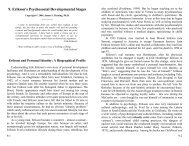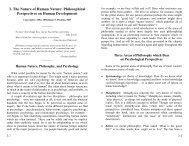7. Piaget, Kohlberg, Gilligan, and Others on Moral Development
7. Piaget, Kohlberg, Gilligan, and Others on Moral Development
7. Piaget, Kohlberg, Gilligan, and Others on Moral Development
Create successful ePaper yourself
Turn your PDF publications into a flip-book with our unique Google optimized e-Paper software.
7-25<br />
Notes<br />
1. <str<strong>on</strong>g>Kohlberg</str<strong>on</strong>g> (1970, pp. 57-58), cited in Turiel (1998, p. 866).<br />
2. I worry about the dangers of stereotyping cultures as much as I<br />
do about the individuals from those different cultures. As an<br />
example, labeling both Japan <str<strong>on</strong>g>and</str<strong>on</strong>g> Bolivia as “collectivist”<br />
cultures may make them seem very similar when in fact they<br />
are otherwise quite diverse. Though both may be c<strong>on</strong>trasted to<br />
the U.S. <strong>on</strong> at least this <strong>on</strong>e dimensi<strong>on</strong>, the broader view is that<br />
peoples differ, even within a given society or culture, <str<strong>on</strong>g>and</str<strong>on</strong>g> the<br />
world itself is not static but c<strong>on</strong>stantly changing.<br />
3. See Eisenberg, Fabes, <str<strong>on</strong>g>and</str<strong>on</strong>g> Spinrad (2006) for an extended<br />
treatment of the development of prosocial (or altruistic)<br />
behavior.




